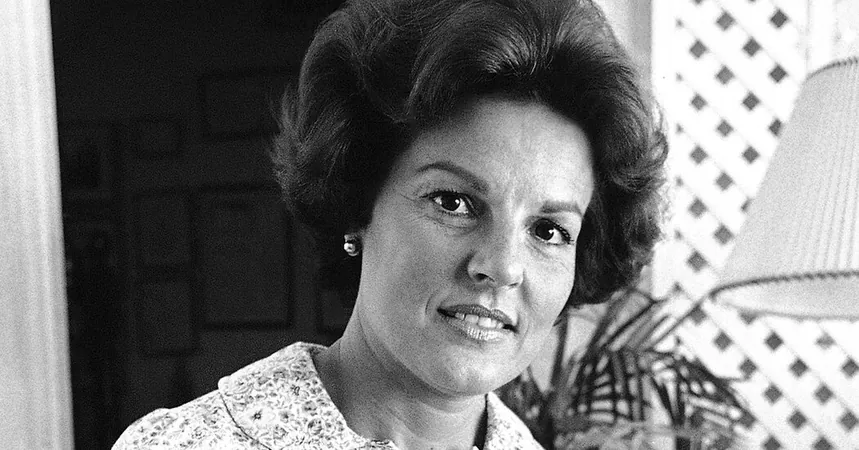
Anita Bryant, Controversial Anti-Gay Activist and Former Singer, Passes Away at 84
2025-01-10
Author: Wai
Anita Bryant, the renowned singer and beauty queen whose powerful voice once topped charts in the 1960s and 1970s, has died at the age of 84. Known for her hit songs like “Paper Roses,” Bryant's career was overshadowed by her fierce opposition to gay rights, which she labeled as “an abomination.” Bryant passed away at her home in Edmond, Oklahoma, on December 16, from cancer, as confirmed by her son, William Green.
Early Life and Career
Born on March 25, 1940, in Barnsdall, Oklahoma, Bryant's early life was marked by her musical talent, which emerged during her childhood singing in church and at local fairs. Her star ascended rapidly when she won the Miss Oklahoma title at 18 and became a second runner-up in the Miss America pageant. This success propelled her into the world of show business, where she made a name for herself as a television personality and commercial spokesperson.
Rise to Fame and Activism
Bryant became a household name through her role as a spokesperson for the Florida Citrus Commission, widely recognized for her catchy jingle, “Come to the Florida Sunshine Tree,” which featured her dressed in cheerful outfits and promoting the virtues of vitamin C. However, her fortunes took a drastic turn in 1977 when she spearheaded a campaign against an ordinance in Dade County, Florida, that aimed to prohibit discrimination against homosexuals.
This pivotal moment in her life marked the beginning of a transformation from a beloved singer to a polarizing figure in American society. She founded the organization Save Our Children, which played a pivotal role in portraying LGBTQ+ rights as a threat to the fabric of family and society. Her activism ignited a fierce backlash and catalyzed the modern religious right movement in America, correlating her anti-gay rhetoric with the preservation of traditional family values and children's rights.
Decline in Public Perception and Career
Less than two months after launching her campaign, the changes to her public perception became evident when doors began closing on her once-promising career. A planned television variety show was canceled, and her lucrative contracts were jeopardized, leading her to proclaim that the “blacklisting of Anita Bryant has begun.” Despite continued efforts to maintain her image, such as her appearance on various television shows, including notable performances on "The Ed Sullivan Show," the fallout from her activism lost her significant sponsorship deals.
Public Backlash and Personal Struggles
One infamous incident occurred in 1977 during a press conference when a protester threw a pie at her, which Bryant famously brushed off with humor, saying, “At least it was a fruit pie.” This moment epitomized the public's mockery of her as media platforms increasingly took to parodying her positions. Sketches on shows like "Saturday Night Live" and "The Carol Burnett Show" lampooned her stances, further embedding her in popular culture.
Following a tumultuous decade marked by public backlash and personal struggles, including a divorce from her manager, Bryant struggled with mental health issues and even contemplated suicide, later reflecting on this period as one of deep despair. Despite her controversies, Bryant continued to publish books, including “The Anita Bryant Story: The Survival of Our Nation’s Families and the Threat of Militant Homosexuality,” which laid bare her fear-based arguments against LGBTQ+ acceptance.
Legacy and Influence
In her later years, while her influence diminished, her story remained pivotal in discussions surrounding religious conservatism and LGBTQ+ rights in America. Anita Bryant's legacy is one that intertwines talent, activism, and the evolution of a cultural narrative that still resonates today as society grapples with issues of equality and acceptance.
 Brasil (PT)
Brasil (PT)
 Canada (EN)
Canada (EN)
 Chile (ES)
Chile (ES)
 Česko (CS)
Česko (CS)
 대한민국 (KO)
대한민국 (KO)
 España (ES)
España (ES)
 France (FR)
France (FR)
 Hong Kong (EN)
Hong Kong (EN)
 Italia (IT)
Italia (IT)
 日本 (JA)
日本 (JA)
 Magyarország (HU)
Magyarország (HU)
 Norge (NO)
Norge (NO)
 Polska (PL)
Polska (PL)
 Schweiz (DE)
Schweiz (DE)
 Singapore (EN)
Singapore (EN)
 Sverige (SV)
Sverige (SV)
 Suomi (FI)
Suomi (FI)
 Türkiye (TR)
Türkiye (TR)
 الإمارات العربية المتحدة (AR)
الإمارات العربية المتحدة (AR)